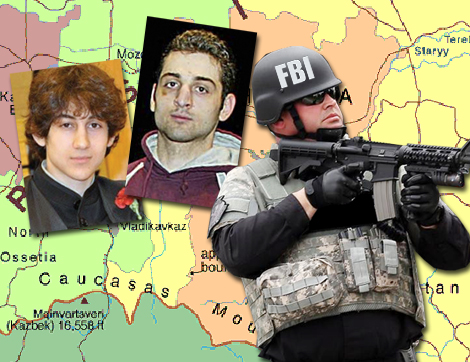
By Richard Walker
What did the Federal Bureau of Investigation (FBI) really know about the Tsarnaev brothers, who allegedly carried out the Boston bombings? That question will remain uppermost in people’s minds until the Bureau comes clean about all the intelligence it had on the family.
The Bureau should reveal the nature of hard intelligence it received in 2011 about the older of the brothers, Tamerlan Tsarnaev. It must also provide evidence of the nature of the surveillance it maintained on Tamerlan and his younger brother, Dzhokhar, at any time in the past two years.
According to their mother, Zubeidat Tsarnaeva, who left Boston a year ago to join her ailing husband in Dagestan, the FBI had her sons under constant surveillance since 2011 and knew the Internet sites her eldest son visited. She told RT (Russia Today) the FBI paid her regular visits and warned her Tamerlan was an “extremist leader,” who was highly influenced by jihadist web sites.
The FBI responded quickly to her claims, as well as others that it had received intelligence on her sons, by declaring it had received a “request from a foreign government” in 2011 about Tamerlan Tsarnaev. As a result of that overture, it did a due diligence search of its intelligence databases and found nothing incriminating on him.
An FBI statement defined the “request” as follows:
“It was based on information he was a follower of radical Islam and a strong believer, and that he had changed drastically since 2010 as he prepared to leave the United States for travel to the country’s region to join unspecified underground groups.”
The so-called “request” was not in fact a request at all. It was a tip-off from Russian’s Federal Security Bureau, the successor of the KGB. It closely tracks Islamic extremists, especially those with links to terror groups within its republics, especially Chechnya and Dagestan, both countries with majority Sunni populations and a high level of terrorist activity. In the past two years, European intelligence organizations have greatly benefited from hard intelligence provide by the FSB. As a consequence, the FBI’s counterparts in Europe, especially in France and Spain, have arrested terror cells with links to groups operating out of Chechnya, Dagestan and Kyrgyzstan. In contrast, the FBI appears to have paid less attention to intelligence coming from the Russians.
Tamerlan Tsarnaev came to the attention of the FSB because of connections he had forged with extremist elements in the Caucuses region. Towards the end of 2011, after he had booked flights to Russia, on the pretext of renewing his Russian passport, he spent six months, visiting both Dagestan and Chechnya. The FSB was sufficiently concerned about the contacts he made it warned the FBI about him. It also wanted to know from the FBI if it was possible he was operating a terror cell in the U.S., especially in the Boston area.
According to the FBI, it found nothing suggesting he was linked to terrorism. It subsequently made that clear to the “foreign government” and received no further intelligence about him from that government.
Perhaps the FBI didn’t ask the FSB for additional intelligence. If so, why not? After all, one would have thought, having been tipped-off by the FSB, and having access to other intelligence indicating his growing radicalization, the FBI would have kept close tabs on him when he was in Russia. They could have asked the FSB to let them know which extreme Islamic groups in Dagestan or in Chechnya he was in touch with, given his family were ethnic Chechens. Surely, it would have been vital to keep tabs on him when he returned to Boston after his six-month vacation in Eastern Europe?
It now seems strange, given the FBI had photos of the Tsarnaev brothers, that it had to rely so heavily on the public’s help identifying them in the immediate aftermath of the bombings. As we now know, the FBI had them on file, especially the older brother, Tamerlan.
The FSB has since made it clear privately it remains convinced the Tsarnaev brothers were being controlled by someone within the U.S. If that is the case, are there others like the Tsarnaevs getting ready to strike? The British are familiar with the dangers of the enemy within syndrome whereas there has not been the same awareness in the U.S. In Britain, many of the terrorists who have been apprehended have had familial links to Pakistan and other regions. Young men visiting relatives in those regions have become radicalized and recruited. The British have also become a lot more conscious of granting asylum to families from regions like the Caucuses, aware of the dangers they might eventually pose.
Richard Walker is the pen name of a former N.Y. news producer.


